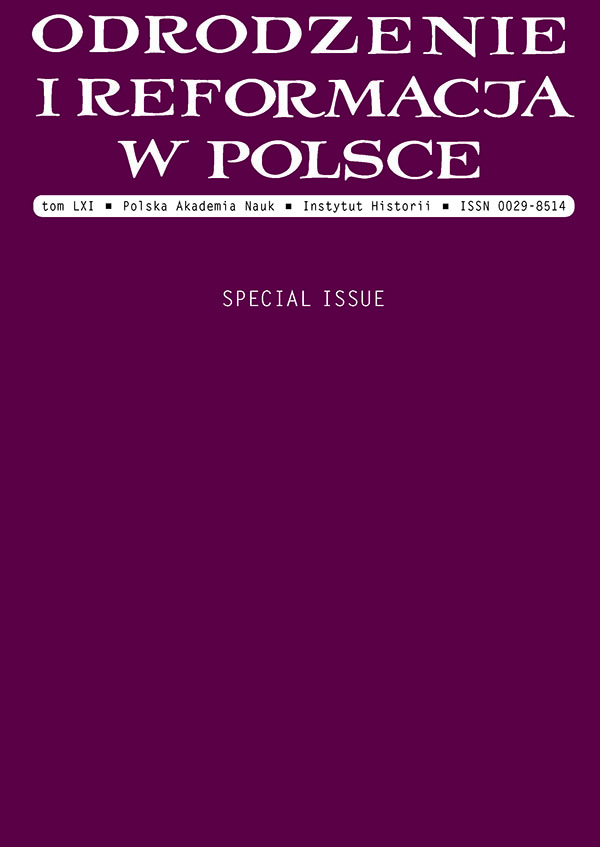A Dangerous Domain: Bartholomew Keckermann on History and Historiography
DOI:
https://doi.org/10.12775/OiRwP.2017.SI.09Ključne reči
Keckermann, history, historiography, logic, rhetoricApstrakt
The main purpose of the paper is to present and discuss some Keckermann’s thoughts on history and the art of historiography, expressed in the treatise De natura et proprietatibus historiae commentarius (Hanovie 1610), published posthumously by his student, David Schumann. According to the humanist from Gdańsk, history is not art, science, or discipline, because it does not have own commonplaces (loci communes), regarded as the basis for method. Nevertheless, history plays an important role in teaching of the practical arts such as politics or economy, because it is an inexhaustible source of examples, taken from narratives about the past events to illustrate general rules related to human life and actions. An excellent historian would be only someone who is able to combine searching for the truth with frankness in its telling. Therefore, he is obliged to use a simple style without almost any rhetorical devices. In relation to single events history serves as a tool of description and explication. Thus it provides the necessary illustrative material in the form of examples for the practical disciplines.Reference
Borowski A., “Staropolska ‘książka dla wszystkich’, czyli Żywoty świętych ks. Piotra Skargi SJ,” in: Retoryka a tekst literacki, ed. M. Hanczakowski, J. Niedźwiedź, vol. 1 (Kraków, 2003)
Dąmbska I., “Logika w Gimnazjum Akademickim w Gdańsku w pierwszej połowie XVII wieku,” in: eadem, Znaki i myśli. Wybór pism z semiotyki, teorii nauki i filozofii (Warszawa, 1975)
Facca D., Bartłomiej Keckermann i filozofia (Warszawa, 2005) Foucault M., Fearless Speech, ed. J. Pearson (Los Angeles, 2001)
Grafton A., What was History? The Art of History in Early Modern Europe (Cambridge, 2007)
[Keckermann B.], De natura et proprietatibus historiae commentarius privatim in Gymnasio Dantiscano propositus a Bartholomeo Keckermanno, philosophiae ibidem professore (Hanoviae, 1610)
Keckermann B., Gymnasium logicum, id est de usu et exercitatione logicae artis absolutiori et pleniori libri tres (Londini, 1606)
Labuda G., Rozwój metod dziejopisarskich od starożytności do współczesności, pt. 1 (Warszawa, 2003)
Lipsius I., Epistolarum selectarum centuria tertia miscellanea (Antverpiae: ex officina Plantiniana, apud Ioannem Moretum, 1605)
Mack P., Renaissance Argument. Valla and Agricola in the Traditions of Rhetoric and Dialectic (Leiden and New York, 1993)
Mokrzecki L., “Kształtowanie się dyscypliny historycznej w gdańskim gimnazjum akademickim,” Gdańskie Zeszyty Humanistyczne. Pedagogika, Psychologia, Historia Wychowania 3 (1969)
Moss A., Printed CommonplaceBooks and the Structuring of Renaissance Thought (Oxford, 1996)
Nadolski B., “Poglądy na historię uczonego gdańskiego Bartłomieja Keckermanna,” Rocznik Gdański 17/18 (1960)
Nadolski B., Życie i działalność naukowa uczonego gdańskiego Bartłomieja Keckermanna. Studium z dziejów Odrodzenia na Pomorzu (Toruń, 1961)
Pomian K., “Historia między retoryką a teologią. Niektóre problemy myśli historycznej doby Odrodzenia i Reformacji,” Odrodzenie i Reformacja w Polsce 9 (1964)
Struever N., The Language of History in the Renaissance. Rhetoric and Historical Consciousness in Florentine Humanism (Princeton, 1970)
Downloads
Objavljeno
Kako citirati
Broj časopisa
Sekcija
Stats
Number of views and downloads: 586
Number of citations: 0



